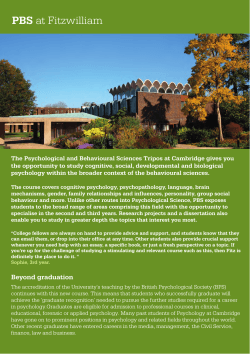
1. dia
Department of Cognitive- and Neuropsychology, Institute of Psychology, University of Szeged The Cognitive Science and Neuropsychology Program has been organized by Csaba Pléh, in 1999, at the Institute of Psychology, University of Szeged. The Department of Cognitive and Neuropsychology is located at the campus of the Faculty of Arts. The Institute of Psychology, of which the Department is part of, is the longest-standing psychology institute in Hungary (founded in 1929). Szeged, Hungary Hildebrand Dezső Várkonyi, founder of the institute of psychology at Szeged, in 1929 Address: Egyetem u. 2., 6722 Szeged, Hungary Phone: +36 62 544509 +36 62 544691 Fax: +36 62 544509 Members of the group teach in the BA program and in the Cognitive and Neuropsychology MA program offered by the Institute of Psychology. The group works to advance theoretical knowledge and clinical practice through experimental and applied research and works in partnership with the Neurological Clinic and the Department of Psychiatry, both at the University of Szeged. Key research areas fall under the following main headings: Recognition and categorization of visual objects, face perception Perceptual-motor skill learning, implicit unconscious learning Cognitive functions in sclerosis multiplex, neglect, stroke and in developmental disorders Sleep and memory processes, effect of sleep deprivation Neuropsychology of neurodegenerative disease Affordance perception in object use, theoretical and historical aspects of embodiment and ecological psychology István WINKLER is Professor of Psychology at the Institute of Psychology, University of Szeged, from 2008 on. He is involved in teaching and is research consultant as member of the Cognitive Science and Neuropsychology Group. He was instrumental in setting up the high-quality EEG laboratory at the Institute and advises research projects in the laboratory. Professor Winkler is also head of the Group of Experimental Psychology and Neuroscience at the Budapest- based Institute of Cognitive Neuroscience and Psychology. Email: winkler18@gmail.com Web: http://www.mtapi.hu/index.php?mi=96&lang=hu& Ágnes SZOKOLSZKY Is Head of the Cognitive and Neuropsychology Department, currently designated for a one-year term. She is habilitated associate professor and director of the Institute of Psychology. She is member of the Cognitive Science and Neuropsychology Group since 1999. Her main research interests are in theoretical and historical aspects of psychology and cognitive science, ecological psychology and embodiment. Email: szokolszky@gmail.com Our EEG Lab was established in 2009 and named after a world-famous Hungarian neurophysiologist Endre Grastyán. Gábor Csifcsák Assistant professor, Head of Lab Research primarily focuses on what determines the recognition and categorization of visual objects. Specifically, we are investigating contextual effects and task-induced modulations during entry-level and superordinate object categorization. In the field of face perception, we are interested in the way how certain personality traits modulate underlying brain processes. Another main topic relates to the prediction of stimulus characteristics determined by self-paced changes in the visual environment. Within this project, our aim is to assess if neural correlates of such anticipatory processes are altered in patients with psychotic disorders, primarily including schizophrenia. Email: gaborcsifcsak@yahoo.co.uk Graduated at the Faculty of Medicine, Szeged University. Gained his PhD degree at the Doctoral School of Clinical Medical Studies at Szeged University. He is manager of the EEG Lab. Eszter CSÁBI Growing body of evidence suggests that sleep contributes to the consolidation of memory by the enhancement of the neuronal plasticity, which leads to the memory representation being more resistance to interference and forgetting. But the beneficial effect of sleep on memory consolidation has not been comprehensively characterized so far. Our investigations focus on the relationship between sleep and different memory processes to clarify this question. Furthermore, we investigate effect of daytime nap on memory functions and the effect of sleep deprivation on memory processes by examining patients with sleep pathologies and shift workers. Assistant professor Email: csabieszti@gmail.com Graduated at the Institute of Psychology, Szeged University. Currently assistant professor at the institute and pursues her PhD studies at the Doctoral School of Clinical Medical Studies at Szeged University. Emese HALLGATÓ Assistant Professor A very important deal of our daily cognition occurs automatically or even without us being aware of it. This kind of knowledge is evident in some of our skills or habits that we gain without intention, or intentionally but without having a conscious control of the learning process. In order to investigate these processes we use perceptuomotor sequence learning tasks where participants respond to series of stimuli by pressing the appropriate buttons (somewhat like playing a piano) and, importantly, the sequence is hidden so that the task appears to be random to them. We investigate the amount of practice that is needed for participants to gain a knowledge that is profound enough to consider their piano-like performance a habit, and we are also interested in how much new learning is necessary to change this habit into a new one by changing the underlying (hidden) sequence at one point of the task. Email: hallgato.emese@gmail.com Graduated at the Institute of Psychology, Szeged University. Currently assistant professor at the institute and pursues her PhD studies at the Doctoral School of ELTE University. MAIN INTEREST: Neuropsychology of neurodegenerative disease, The role of cerebellum and basal ganglia in cognitive processes, Risk of postpartum depression, The effect of carotis stenosis on cognitive functioning and anxiety. Tamás SEFCSIK Assistant professor Email: sefcsik@gmail.com Graduated at the Institute of Psychology, Szeged University. Currently assistant professor at the institute and pursues his PhD studies at the Doctoral School of Clinical Medical Studies at Szeged University. MAIN INTEREST: Measuring working memory and executive functions after stroke Neglect Investigating the neuropsychological background of Sclerosis Multiplex Tímea TÁNCZOS Investigating working memory and executive functions in learning and developmental disorders Age-related changes in verbal fluency across the lifespan Email: timeatanczos@gmail.com Number of words on semantic fluency test 30 Number of words Graduated at the Institute of Psychology, Szeged University. Currently assistant professor at the institute and pursues her PhD studies at the Graduate School of Educational Sciences at Szeged University. 25 20 15 10 5 0 Age
© Copyright 2025











